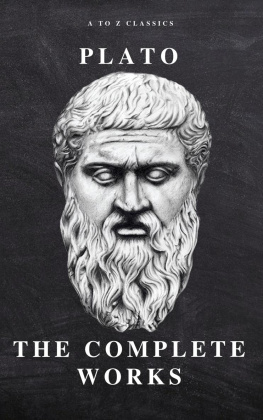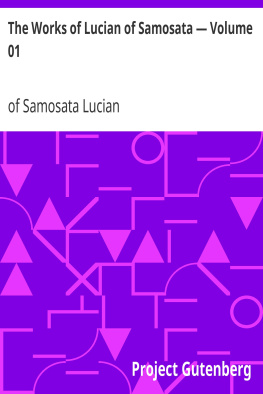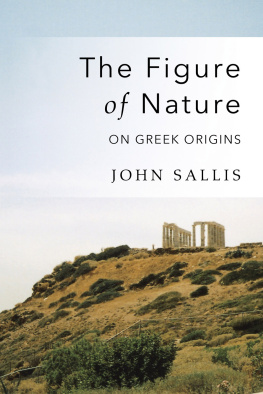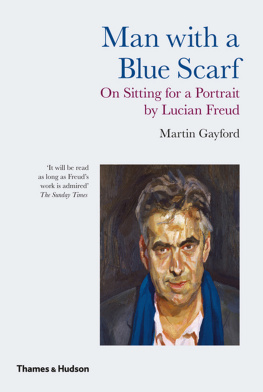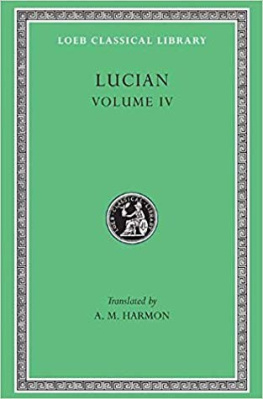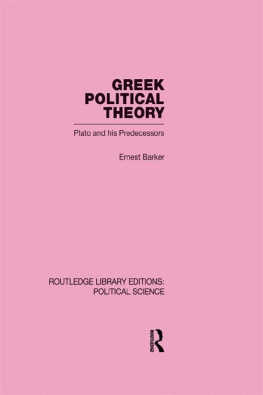This edition is published by Muriwai Books www.pp-publishing.com
To join our mailing list for new titles or for issues with our books muriwaibooks@gmail.com
Or on Facebook
Text originally published in 1931 under the same title.
Muriwai Books 2017, all rights reserved. No part of this publication may be reproduced, stored in a retrieval system or transmitted by any means, electrical, mechanical or otherwise without the written permission of the copyright holder.
Publishers Note
Although in most cases we have retained the Authors original spelling and grammar to authentically reproduce the work of the Author and the original intent of such material, some additional notes and clarifications have been added for the modern readers benefit.
We have also made every effort to include all maps and illustrations of the original edition the limitations of formatting do not allow of including larger maps, we will upload as many of these maps as possible.
LUCIAN, PLATO AND GREEK MORALS
BY
JOHN JAY CHAPMAN
TABLE OF CONTENTS
Contents
TABLE OF CONTENTS
ACKNOWLEDGMENT
I GLADLY take this opportunity of expressing my thanks to the Oxford University Press, of London and New York, and to Professor Edward Capps and Messrs. G. P. Putnams Sons, editor and publishers of the Loeb Classical Library, not only for permission to publish the extracts from their translations of Lucian, but for their services to popular scholarship in keeping the name and substance of Lucians Dialogues alive for this generation of English and American readers. My personal gratitude is deep. I have been obliged to condense the Dialogues by certain omissions; but my endeavor has been to add no scrap of my own as to the rendering; for my scholarship is but that of an amateur. As the Dialogues are most of them short and all of them clear, there will be no difficulty for any readers of my transcriptions in finding the places in the original; and to encumber the pages of the book with minute references would be superfluous and almost misleading to the reader; for this book is merely an essay in popular form, whose aim is really to call attention to the Fowler and Harmon translations and thereby, ultimately, to Lucian himself.
JOHN JAY CHAPMAN
May 5, 1931
I. INTRODUCTORY
MAY the Muses forgive me if I seem ungrateful to that race of scholars who have given us access to the literature of Greece and Rome. When I am cross with them, the child scratches his nurse. For where should I have been without the protection and the solicitude of these great drudges who have been at work over my education for centuries? Nevertheless, there is something in a child, when he scratches his nurse, that is justified. She annoys him by her fussiness: she straightens his bib, corrects his manners, rules him in the bathtub, and bothers him with external attention. Is it not in spite of the attentions of the nurse that the inner, baffled, struggling spirit of the child comes into its own?
Literature is for our immediate happiness and for the awakening of more literature; and the life of it lies in the very seed and kernel of the grain. Footnotes and critical information attack the creative instinct. The spirit is daunted, the tongue tied by them. Many a lad has known less about Shakespeare after a college course on Shakespeare than he did when the only phrase he knew was Aroint thee, witchand he didnt know where that came from. Now he can write the etymology of the words on an examination paper; but the witch herself has vanished. Information is the enemy to poetry. If the old Greeks had known as much about Achilles as we do, the Iliad would never have been written. There was a certain professor at one of our colleges who for many years made it a practice to read aloud to his classes bits from the old English classics. In this way he gave the boys a taste for letters. Speaking of this man, William James once said to me, Oh, the authorities will never make X a full professor, because he doesnt know the critical stuff; yet X has done more for the cultivation of the Harvard boys than all the rest of us put together.
The Nineteenth Century has left a hedge of critical literature about every great writer of antiquity. By the time a student has bored his way through the treatises, he is old, and he is dull. He cannot taste the honey, for he has exhausted himself in cutting down the tree. Let us climb and sip. Three generations of modern scholars have befogged and begoggled their wits over schylus and Horace. Let us never read the learning of these investigators. Let us be ignorant, nimble, and enthusiastic. Let us never drink of that cup of delusion, critical knowledge. A scholar reads the books of other scholars, lest he shall say something that shows ignorance. Conscience and professional ambition keep him at it. He dare not miss a trick; just as the social climber dare not miss a party. Jaded and surfeited, both scholar and climber accept the servitude. They must know all these dull people, because these dull people are in the game that they are playing. Thus, one result of scholars and scholarship is to interpose a phalanx of inferior minds between the young intelligence and the great wits of the past. Must the novice read those forty pages of Wilamouwitz Mollendorff which cover each dialogue of Plato like the grease on a Strasbourg pt?
Scholarship has taken Cerberus from Hades and set him to guard Apollos hill. Letters have borrowed from the exact sciences a sort of parade of accuracy, forgetting that good literature is always inaccurate. When Christ quotes Isaiah, he quotes inaccurately. When Shakespeare or Voltaire, Scott or Byron, or any great writer uses a bit of the past, he twists and distorts it. You will reply, Ah, but they are not professional scholarsthe great writers. This is the very question in hand, namely, the meeting-place between scholarship and literature. Perhaps there is a reason why professional scholars are not great writers. Accurate scholarship means unimaginative scholarship. Accurate scholarship, when it prevails, is the epilogue to literature.
II. LUCIAN THE MAN
LUCIAN is a mine of entertainment, a treasury of information. He is a humorist, a man of wit, fancy, irony, earnestness, solemnity, subtle humor, broad burlesque, a man of immense reading and incredible fluidity of thought and word, who writes sometimes with the care of a gem-cutter, and often with the freedom and splash of Shakespeare. He is the latest of the wits of antiquity and the earliest of the modern humorists. He has left eighty pieces, long and short, of very unequal excellence, the paperasse of a great littrateur . Among these things are a few masterpieces which show a finish and subtlety that rank them with the best Hellenic handiwork. The serpent of immortality lies coiled within them.
He was a Syrian, born in about A.D. 120 at Samosata on the Euphrates, a lecturer by profession, and at the time of his death he held high office in the Imperial Treasury in Egypt. The only one of his works that can be approximately dated is his own account of his triumphant return to his fellow townsmen at the age of fortybeing already rich and famous. In this he says that in his boyhood his parents sought to make him follow the family trade of stone-cutting from which he was saved by a vision. A Sibyl appeared to him, who was the genius of general cultivation, and invited him to step into a chariot. She exhorted him as follows: They say that some men become immortal. I shall bring this to pass with you; for although you yourself depart from life, you will never cease to associate with men of education or to converse with men of eminence. When I had mounted, she plied whip and reins and I was carried up into the heights and went from the East to the very West, surveying cities and nations and peoples, sowing something broadcast over the earth like Triptolemus. I do not now remember what it was that I sowed; only that men, looking up from below, applauded, and all those above whom I passed in my flight speeded me on my way with words of praise.




